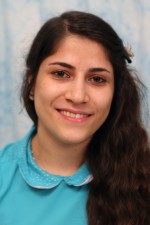
PhD Thesis Proposal
May

Carnegie Mellon University
3:00 pm to 4:00 pm
Zoom Link
Abstract:
We focus on robotics applications where a robot is required to accomplish a set of tasks that are partially observable and evolve independently of each other according to their dynamics. One such domain that we target in this work is decision-making for a robot waiter waiting tables at a restaurant. The robot waiter should take care of an ongoing stream of requests, namely serving a number of tables, including delivering food to the tables and checking on customers. An action that the robot should take next at any point of time depends on the duration of possible actions, the state of each table, and how these tables evolve over time, e.g., the food becomes cold after a few time steps. A conventional approach to deal with this problem is to combine all the tasks’ states and robot actions into one large model and compute an optimal policy for this combined model. For the problems that we are interested in, the number of tasks, e.g., the number of tables in the restaurant domain, can be large making this planning approach computationally impractical and challenging.
We target the class of problems that include multiple tasks that evolve independently of each other and develop algorithms to enable a robot to achieve the multiple tasks while expediting robot planning and execution. Our solution takes advantage of the structure in this class of problems, namely the independency between the tasks, to speed up planning and execution. We provide a theoretical and experimental analysis of the algorithms. We discuss how we formalize the restaurant domain and define the assumptions under which the restaurant domain can be an instance of this class of problems. We demonstrate the effectiveness of our solutions in a simulated restaurant setting and on a robot.
Although our solutions are effective where the planning model is strictly followed, it fails in situations where the robot’s planning model is an approximation of the true model. For example, in our hard-coded restaurant model the customers cannot order more food after eating their dessert, so if the customers ask for the menu, the robot does not know how to proceed with the request. Most planning methods require a known and good planning model. This can be a severe limitation for many practical applications such as the restaurant domain for which an exact complete model does not exist. In the remainder of this thesis, we will develop efficient planning and execution algorithms to address this problem by handling the discrepancies resulting from the mismatch between the robot’s observations and the robot’s model. We will address the discrepancies by querying the users about their states. The answer to the queries will enable the robot to decrease its uncertainty over the users’ state and eventually resolve the discrepancies. We will explain how this approach can be combined with our planning and execution algorithms to enable the robot to accomplish multiple tasks in a real-time and scalable fashion. Finally, we plan to implement our proposed work and evaluate it on a real-robot with a limited number of tables and show the effectiveness of our algorithms in various scenarios.
Thesis Committee Members:
Manuela Veloso, Co-chair
Maxim Likhachev, Co-chair
Henny Admoni
Sonia Chernova, Georgia Institute of Technology